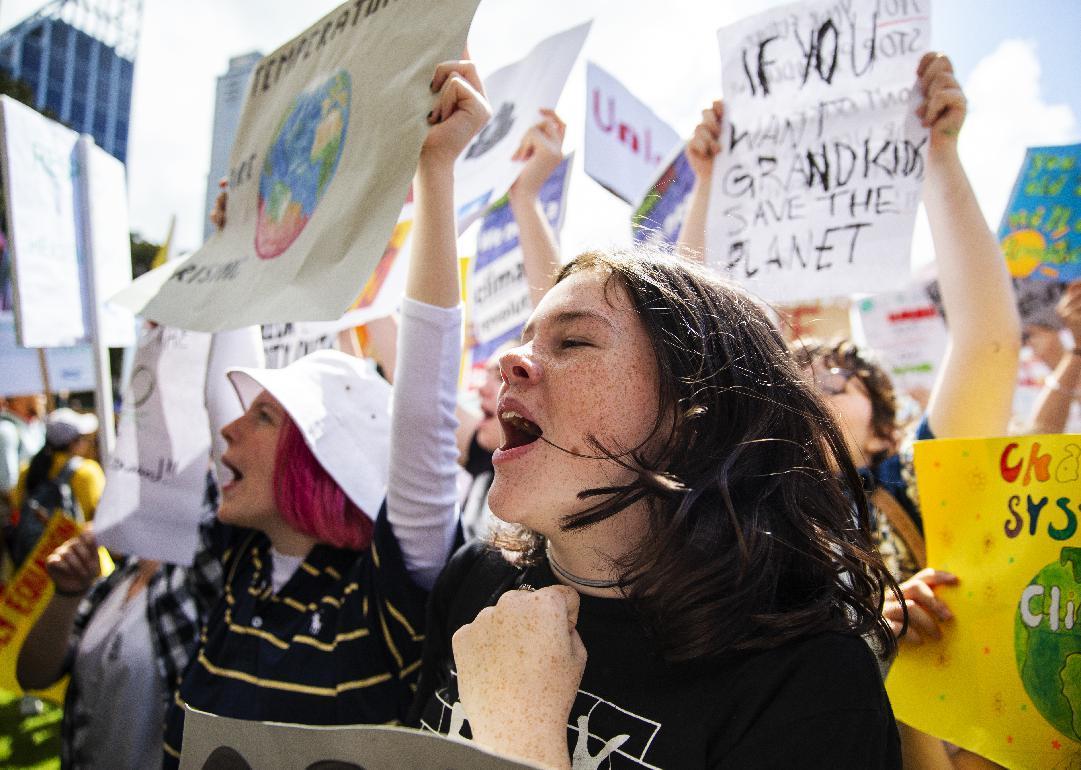
This week's news by the numbers: September 14–20
This week's news by the numbers: September 14–20
Stacker distills the week's news from around the world into key facts and figures. This week's takeaways include the drone strike on Saudi Arabia's oil processing plant, the youth-led Global Climate Strike, and Tropical Storm Imelda. Click through to read more about some of this past week's biggest headlines.
You may also like: This week's news by the numbers: September 7–13
Hundreds of thousands of youth lead Global Climate Strike
Around the world, hundreds of thousands of youth took to the streets as part of the “Global Climate Strike” to demand climate change action. Inspired in part by 16-year-old Swedish activist Greta Thunberg’s demonstrations “Fridays for Future,” children and adults alike in Sydney, New York, Kabul, Nairobi, and beyond marched to convey a message of urgency around climate change action.
Strike on world’s largest oil processing plant cuts production by half
On Sept. 14, Saudi Arabia’s Abqaiq plant, the largest crude oil processing plant in the world, was struck in a drone attack. The attack resulted in 17 points of impact, knocking out half of the kingdom’s oil production. At full operational capacity, Abqaiq can produce more than 7 million barrels of crude oil a day. The Khurais processing plant was also struck in the coordinated attack.
Yemen’s Houthi rebels claimed responsibility for the drone strikes, but analysts believe an attack of that scale and level of sophistication is beyond their capability. Additional details like the trajectories of the incoming objects do not align with an attack from Yemen, but rather a launch point from the west like Iran or Iraq.
Drone material recovered from the site bears a strong resemblance to Iranian drones and has led many to speculate that Iran was responsible for the attack. Saudia Arabia claimed that the strike on Abqaiq was “unquestionably sponsored by Iran” while the U.S. also alleged Iran’s involvement as retaliation against American sanctions, which crippled its oil industry.
Iran has denied involvement in the attack. Iranian Foreign Minister Mohammad Javad Zarif warned that any retaliatory strike on Iran by the U.S. or Saudi Arabia will result in “an all-out war.”
21 infected, 5 deaths in EEE uptick
The CDC reported that the number of confirmed cases of eastern equine encephalitis, or EEE, is higher than usual this year. To date, 21 people in six states have been infected with the rare mosquito-borne illness—triple the number of illnesses seen on average in previous years. Five people have died so far this year, including three from Michigan, one from Rhode Island, and one from Massachusetts.
Cases of EEE are typically confined to New England and states along the Gulf of Mexico or Great Lakes, usually in or near red maple and white cedar swamps. Massachusetts has reported eight cases, followed by Michigan, Rhode Island, Connecticut, New Jersey, and North Carolina.
Symptoms including headache, high fever, chills, and vomiting start four to 10 days after a person is bitten. Infected persons may also experience disorientation, seizures, and coma as the disease progresses. Inflammation of the brain leads to death in about one-third of EEE cases, and people who do survive are often left with brain damage.
Imelda leaves 3 dead, hundreds displaced
Tropical Storm Imelda has left three men dead and hundreds displaced in southeast Texas. The National Weather Service said preliminary estimates suggest that Jefferson County was hit with more than 40 inches of rain in just 72 hours. This would make Imelda seventh-wettest tropical storm to hit the continental U.S.



